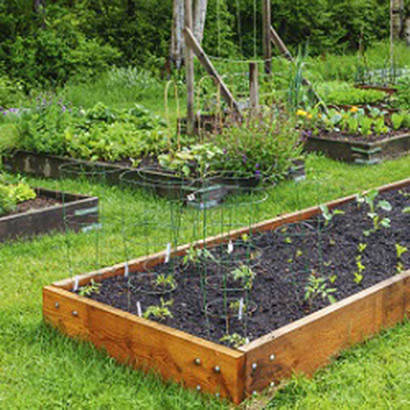
Evanston’s Community Garden program began in 1976. Currently, there are four community garden sites in the city. The city’s first youth-oriented garden started a few years ago when youth, who were enrolled in a recreation center after-school program, planted and managed a garden plot at one of these sites. In addition to doing hands-on work, youth learned about health and nutrition, and educational skills were integrated into their gardening work. The gardening program complements the recreation center’s Get Healthy
Initiative, which teaches the children about healthy eating habits and also has an exercise and fitness component. As part of the after-school program, the children grow herbs and other plants indoors during the winter and start planning their summer garden.
The NRPA grant enabled the department to move the youth garden to the nearby Fleetwood-Jourdain Community Center and substantially increase its size. Sixteen children aged 5 to 12 work in the garden, along with eight seniors and a few other residents from the surrounding neighborhood. Bob Dorneker, Recreation Superintendent, described the now-flourishing garden as, “[previously] a large patch of weeds. … We used part of that [NRPA] fund and a majority of city funds actually, and we’ve actually brought in fresh soil to the area. We built raised beds. We did a little pathway in there so it is really an area now that is very nice in the community.”
The youth garden is located in a dense and diverse neighborhood that has a fairly wide income range, from poor to middle class. It is about 75% African-American, 20% Latino, and 5% white. The neighborhood also has a large population of seniors, many of whom have lived there for a long time and feel a strong connection to the community. The children, seniors, and other volunteers who work in the garden all live in this neighborhood.
Becky Jenkins, Building Manager of Fleetwood-Jourdain Community Center and Director of Parks and Recreation’s Ecology Center, described the program’s goals as: “With the children, we are trying to teach them better eating habits. Teaching that they can rely on the earth to grow their food. Teaching them how… they can build relationships with some of the seniors or other people they come in contact with.”
The program also addresses a broader neighborhood issue — the absence of local grocery stores in which to buy fresh food. Although the garden is located in an area that the city is trying to develop economically, it is currently a “food desert”. The program gives the children greater access to fresh food by equipping them with the skills to grow it in their own yards.
The program can be sustained at its current size within the Parks and Recreation Department’s operating budget due to the fact that expenditures for the garden’s infrastructure have already been made. Mr. Dorneker and Ms. Jenkins, however, are seeking sponsorships from local businesses and other partnerships in order to grow the program. They would like to increase the number of children involved and eventually expand the size of the garden area to enable adults in the neighborhood to use it. They hope that it will truly become a community garden.
When asked about the successes to date, Ms. Jenkins replied, “I think the fact that we did get the garden started and everything is growing and people are being involved. And I think the fact that we have young children and older adults together and they are working and teaching and the kids are paying attention. That is a success for me. … I mean I’m seeing relationships being built. [The seniors] are coming to the point where they see these kids, or these kids see them — they know their names. They exchange a hug maybe. …They are glad to see each other.”
When this year’s produce is harvested, there will be an event for everyone involved in the garden — children, their parents, seniors and other volunteers who worked in the garden, and staff. They will share a meal using food from the garden and the entire experience will be celebrated.
